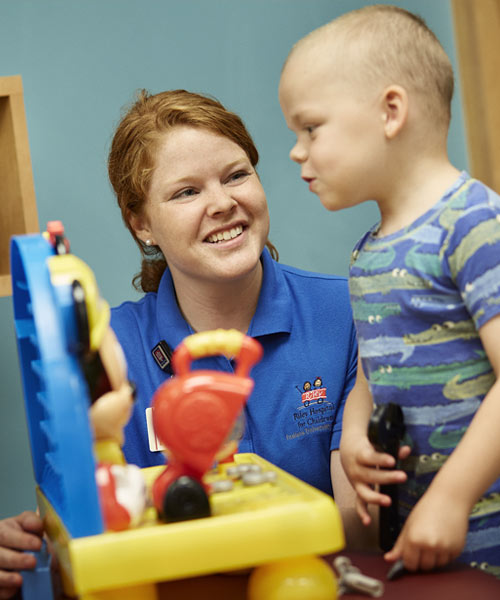First Robotic Surgery Performed at Riley at IU Health
A team of pediatric urologists has performed the first robotic surgery at Riley at IU Health, making it the only children's hospital in the state to provide the capability on site.
Compared to traditional "open" surgery, there are advantages to doing some procedures robotically, including shorter hospital stays, quicker resumption of daily activities, and less pain and scarring. As opposed to other minimally invasive approaches, surgeons don't operate at the bedside, but instead are perched a few feet away at a console, where they monitor the surgical site through a highly magnified 3-D viewfinder. There, they control the robot's arms, which are equipped with tiny surgical instruments that can rotate in ways the human wrist can't. They perform delicate procedures through incisions smaller than the width of a dime - regardless of the patient's age or weight.
"Our goal is to provide the very best, cutting-edge care to Hoosier children and beyond," said Dr. Mark Cain, chief of pediatric urology at Riley at IU Health.
Toward that end, the approximately 2,220 pound da Vinci ® Surgical System was carefully transported to Riley at IU Health through underground tunnels, marking a milestone in the hospital's efforts to deliver innovative, state-of-the-art therapies to its patients. While children have previously undergone robotic procedures at IU Health adult facilities, "We're strengthening Riley at IU Health by bringing the robot to our home court," where everything from patient rooms to pain medications are specially designed for children, said Dr. Benjamin Whittam, a pediatric urologist and robotic surgery specialist at Riley at IU Health. That "home-court advantage" makes it possible to extend the technology to younger and younger patients, for whom between-hospital transfers are difficult.
Ranked third in the nation by U.S. News & World Report, Riley at IU Health's pediatric urology department is already highly regarded for its ability to care for the most common and complex urological conditions. Robotic surgery will enhance that capacity, said Dr. Cain. For now, his team will be the only group offering the technology at Riley at IU Health. They will bring the robot over on a monthly basis to perform pyeloplasties, which repair blockages in the tubes that drain urine from the kidneys, and ureteral reimplant surgeries, which correct a defect that allows urine to backwash into kidneys.
The hope, said Dr. Cain, is for Riley at IU Health to acquire its own free-standing robot and to potentially expand its use beyond pediatric urology. Still, neither every procedure nor every patient will be a good candidate for robotic surgery.
Media Contact
Lindsay Lyon, llyon1@iuhealth.org 317.962.5500




